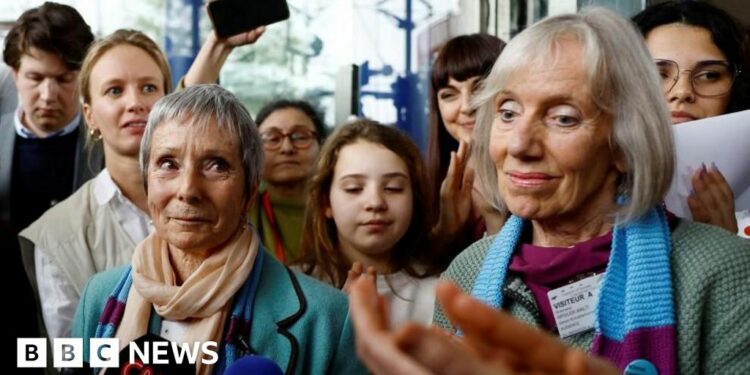Swiss women who won a historic ruling on climate change at the European Court of Human Rights say they feel shocked and betrayed by their parliament’s decision not to comply with it.
The women, known as “climate seniors”, previously took their case to the court in Strasbourg, France, arguing the Swiss government’s inadequate response to climate change – and in particular extreme heat events linked to global warming – was damaging their right to health and life.
The court agreed in April and ordered Switzerland, which has so far failed to meet is targets to reduce greenhouse gas emissions, to do more.
The court’s rulings are binding for member states, and this decision was unprecedented.
Climate activists had hoped it would send a signal to other governments that human rights law could be used to defend citizens who believe their health is being harmed by worsening environmental factors.
However Switzerland’s parliament voted on Wednesday to reject the ECHR’s ruling, suggesting it was not “ignoring” it, as some critics have claimed, but rather that Switzerland did not need to react as it already had an effective climate change strategy.
The debate in parliament was at times emotional, with right-wing politicians criticising what they saw as an overreach by “foreign judges”, and Green Party members describing the tone of the discussion as “shameful” and “populist”.
Switzerland is currently not on course to reach its Paris Climate Agreement goals – which seek to limit global warming to 1.5C above pre-industrial levels – and opinion polls show many Swiss are worried about this.
The Alpine climate is especially sensitive to global warming, and studies show that their glaciers, which are crucial to Europe’s water supply, could be gone by the end of the century if temperatures continue to rise.
But the Swiss are also very proud of their system of direct democracy. They are used to making decisions themselves, and the “foreign judges” jibe resonates with them.
Last weekend, voters backed government proposals to generate more electricity from renewables. Despite environmental groups’ claims that the measures are still not enough to meet climate goals, opinion polls show a majority of voters reject the ECHR’s involvement, and think Switzerland is already doing enough to protect the environment.
Other countries – notably the United Kingdom – will be looking closely at Switzerland’s rebuff of the rights court. The UK government’s plan to deport asylum seekers to Rwanda has led to pushback from the Strasbourg court, and some British voters now say the UK should leave the body.
In Switzerland, such a move is very definitely not on the cards – or not yet.
Although parliament has suggested compliance with the ECHR’s climate ruling is not necessary, the final decision on whether to abide by it is up to the Swiss government, which is expected to announce its verdict in August.
The ECHR did not tell Switzerland exactly what it had to do to tackle climate change, it simply said it had to do more.
It is possible that, in the good Swiss tradition of compromise, the government will offer the court in Strasbourg a list of all the measures it has taken since the climate seniors first started building their case, and hope that is accepted.
If it is not, the Swiss climate seniors say they may return to court.
Source link : https://www.bbc.com/news/articles/cl55ggjqvx7o
Author :
Publish date : 2024-06-12 07:00:00
Copyright for syndicated content belongs to the linked Source.


